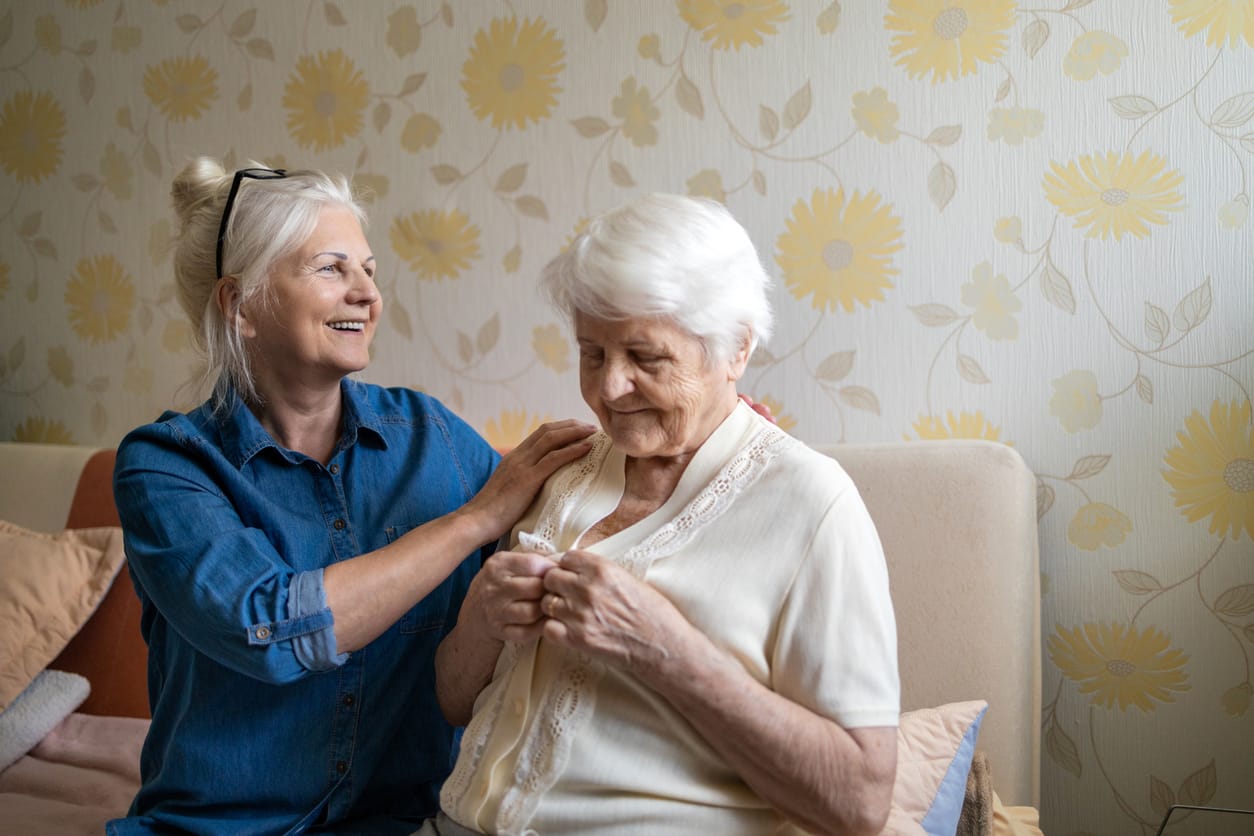If you’re caring for a loved one with dementia, you’ve probably faced situations where they insist there are strangers in the house—even when you know there’s no one there. These moments can be distressing, both for them and for you. But with the right approach, you can help them feel safe and reassured without escalating their anxiety.
Why Does This Happen?
When someone has dementia, their brain processes the world differently. They might misinterpret shadows, reflections, or even familiar faces. A family member walking into the room might suddenly seem like a stranger. Other times, memories from the past blur into the present, and they may believe they’re living in a different time—one where unknown people should be around.
To them, this fear is very real. That’s why simply telling them “there’s no one there” often doesn’t help. Instead, approaching the situation with empathy and reassurance can make all the difference.
Your First Instinct May Backfire
It’s natural to want to correct them: “Dad, no one’s here, you’re imagining things.” But this kind of response can actually make things worse. If they truly believe someone is in the house, being told they’re wrong can make them feel dismissed, frustrated, or even more fearful.
Instead of contradicting them, try acknowledging their emotions. Saying something like, “That sounds scary—let’s check together and make sure everything’s okay,” can help them feel heard and supported rather than ignored.
Helping Them Feel Safe
If your loved one believes there are strangers in the house, here are some simple ways to reassure them:
- Walk through the house together – Show them that doors are locked and that everything is as it should be.
- Use familiar objects to ground them – Point out their favourite chair, family photos, or a well-loved blanket to gently remind them that this is their home.
- Keep your tone calm and comforting – Your body language and voice matter just as much as your words. Speaking gently can help ease their anxiety.
- Provide distractions – Once they’re reassured, guide them into a calming activity, like listening to music, having a cup of tea, or watching a favourite show.
Joining Their Reality Instead of Fighting It
Instead of forcing your reality onto them, try stepping into theirs. If they say, “There’s a man in the living room,” instead of saying, “No, there isn’t,” you could ask, “What does he look like?” Sometimes, just talking through their fears is enough to ease their mind.
If they remain anxious, reassure them by saying, “I’ll take care of it.” You might even pretend to “check” and then return with a comforting, “Everything is okay. You’re safe.”
Understanding the Emotions Behind Their Fear
Often, when someone with dementia insists there are strangers in the house, the fear isn’t really about intruders—it’s about feeling vulnerable. They may be experiencing:
- Fear – The world around them feels unfamiliar.
- Confusion – Their memories are mixing past and present.
- Frustration – They sense something is wrong but can’t explain why.
- Loneliness – They might be missing people from their past and “seeing” them again.
Understanding these emotions can help you respond with patience instead of frustration.
Reassurance Comes in Many Forms
Reassurance isn’t just about words—it’s about actions, too. Here are some ways to help them feel safe:
- Check the locks together – This can give them a sense of control.
- Create a calming routine – A predictable evening routine can reduce nighttime fears.
- Use soft lighting – Dimly lit spaces can create confusing shadows that might look like people. Keeping the house well-lit can help.
- Play familiar sounds – A favourite song, an audiobook, or even the radio playing softly can create a comforting atmosphere.
Patience and Flexibility: Your Best Tools as a Caregiver
Dementia isn’t predictable. What works today might not work tomorrow. That’s why patience and flexibility are so important.
If one approach doesn’t work, try another. If they’re particularly anxious, switching topics or giving them a gentle distraction—like handing them a warm drink or taking them to sit by a window—might be what they need in that moment.
Keeping a small journal can also be helpful. Note what worked well and what didn’t—over time, you’ll start to see patterns in their behaviour and figure out the best ways to respond.
Taking Care of Yourself Matters Too
Caring for a loved one with dementia is emotionally demanding. If you ever feel overwhelmed, take a step back, breathe, and remind yourself that you’re doing your best. It’s okay to ask for help—from family, friends, or support groups.
You don’t have to handle every challenge alone. Talking to others who have been through similar experiences can be incredibly reassuring.
You’re Doing Better Than You Think
It’s easy to feel like you’re not doing enough, but every small moment of reassurance, every time you calmly talk them through their fears, you are making a difference. Even on the hardest days, your presence and care mean the world to them—even if they can’t always express it.
FAQs: What to Do When Your Loved One Sees Strangers in the House
What should I do if my loved one refuses to believe they are safe?
Try not to argue or insist they’re wrong. Instead, reassure them by calmly checking the house together and pointing out familiar items. A gentle touch, a calm voice, or engaging them in a comforting activity can help ease their worry.
How do I keep my own frustration in check?
It’s completely normal to feel frustrated at times. If you’re feeling overwhelmed, take a deep breath before responding. Stepping away for a few moments, talking to a friend, or writing down your thoughts can also help you reset. You’re human, and it’s okay to need breaks.
Are there ways to prevent these fears from happening in the first place?
You can’t always prevent them, but creating a calm environment helps. Keep lighting soft but consistent, minimise mirrors (which can sometimes confuse them), and play familiar sounds to create a soothing atmosphere. A steady daily routine can also reduce anxiety.
Why does my loved one think there are strangers in the house?
Their brain may be misinterpreting sights or sounds, or they might be recalling past memories as if they’re happening now. Sometimes, loneliness can also play a role—they might be “seeing” people from their past because they miss them.
Where can I find support as a Caregiver?
There are dementia support groups, online communities, and local organisations that offer resources and advice. Speaking to others who understand what you’re going through can provide emotional support and helpful strategies. Don’t hesitate to reach out—support is out there.
By responding with patience, reassurance, and creativity, you can help your loved one feel safe and supported—even in moments of fear or confusion. You’re doing an incredible job, even on the tough days. And remember: you don’t have to do it alone.
Discover More Support & Information For Your Care Journey
Visit our Learning Centre for expert articles, helpful videos, in-depth guides, and answers to common questions – helping you make informed care decisions with confidence.
Jayne is a highly experienced dementia care specialist with over 17 years in the field. She began her career in 2004, progressing through roles such as hourly visiting carer, coordinator in the live-in care department, and lead dementia trainer. Jayne completed Specialist Practice in Dementia (Mental Health) at Worcester University and has developed bespoke dementia training for managers, carers, and family members.
Recognised for her contributions, Jayne received the National Dementia Care Personality award at the Great British Care Awards 2012. She has also been a speaker at numerous conferences and reviewed dementia-related publications.
Now with Unique Senior Care, Jayne works as a recruitment consultant, recruiting carers both in the UK and overseas, contributing to dementia training for both staff and families. Jayne’s dedication to compassionate, person-centred dementia care is evident in her extensive experience and numerous achievements.


